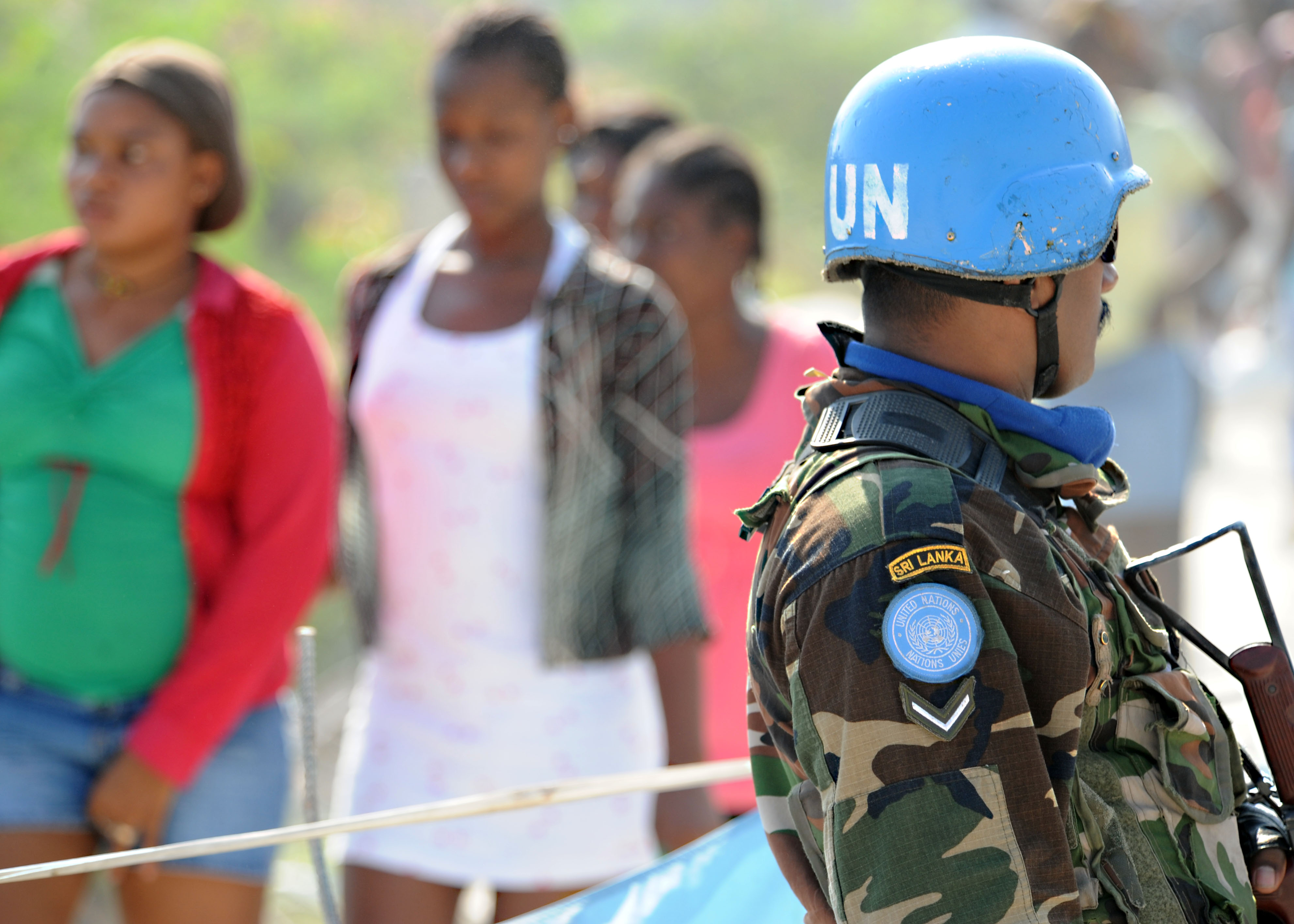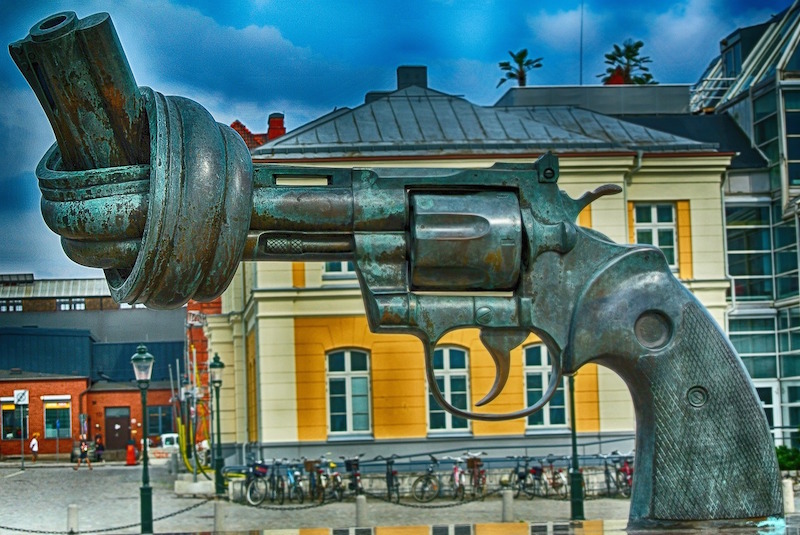The U.N. peacekeeping department last week banned the deployment of non-essential Sri Lankan army troops in U.N. peacekeeping missions, citing the country’s appointment of an alleged war criminal to a top military post. The appointment of Sri Lanka’s new army chief, Lt. General Shavendra Silva, was criticized by the U.N., the United States, and the European Union. During the final stages of the country’s military campaign in early 2009, Silva commanded Sri Lanka’s 58th division to obliterate the Tamil Tigers. A separatist militant movement known for pioneering suicide terror attacks, the Tamil Tigers were fighting against the Sri Lankan government at the time, with the goal of establishing a separate homeland for minority Tamils in the northern and eastern parts of Sri Lanka. The country’s military has been accused of committing war crimes in a campaign that resulted in the deaths of tens of thousands of Tamil civilians, according to the United Nations.
The U.N. High Commissioner for the United Nations, Michelle Bachelet, announced last month that Silva’s appointment was “deeply troubling” given the “serious allegations of gross violations of international human rights and humanitarian law against him and his troops during the war.”
“A Sri Lankan Army unit and individual officers currently serving with U.N. Peacekeeping will thus be repatriated, beginning next month, in accordance with their rotation dates and will not be replaced by Sri Lankan personnel,” said Farhan Haq, the deputy spokesman for U.N. Secretary-General António Guterres. He added the U.N. is “grateful” for Sri Lanka’s contribution of troops to six U.N. peacekeeping operations but is troubled by Silva’s promotion.
This is not the first time the Sri Lankan army has faced such allegations. Earlier this year, it emerged that 49 Sri Lankan peacekeepers deployed to Lebanon had not been vetted. In 2007, 100 Sri Lankan peacekeepers were sent home for sexually abusing children in Haiti, but despite promises by the Sri Lankan government, they never faced prosecution.
In July 2018, The Guardian reported that, according to a confidential report, Sri Lankan army officers implicated in the abuse of Tamils were operating in Africa as UN peacekeepers. The document, seen by the Observer, and sent to the UN’s Department of Peacekeeping Operations, claimed that senior Sri Lankan officers accused of war crimes have been deployed to UN operations in Mali, Lebanon, Darfur and South Sudan.
Yasmin Sooka, executive director of the International Truth and Justice Project, who has sat on a UN commission inquiry into sexual exploitation and abuse by peacekeepers in the Central African Republic, said: “Sri Lanka’s security forces were involved in mass atrocities in 2009, for which there has been zero accountability – instead, alleged war criminals have been promoted and rewarded with prestigious and lucrative UN postings.
“This is an affront to those they are supposed to be protecting in Mali and Lebanon – as well as to victims in Sri Lanka who are desperate for justice. The UN needs to ensure countries like Sri Lanka publish the names and photographs of their peacekeepers a reasonable period before deployment, so that civil society can play a role in vetting them. Peacekeeping is a privilege, not a right – only the very best should represent the country.”
While the Sri Lankan army is being criticized by the UN in the international arena, the Sri Lankan military’s reputation in the country has also been tarnished following the Easter Sunday explosions, in which more than 250 people were killed and another 500 injured. Numerous critics accuse the country’s military of being above the rule of law and so corrupted that they do not respect the judicial process.
For instance, the Sri Lankan military has recently defended its decision to reinstate an intelligence official arrested in 2017 on suspicion of attacking journalists, saying the intelligence officer is the right person to investigate the Easter bombings. According to a report by Reuters, “Major Prabath Bulathwatte was arrested on suspicion he assisted in the abduction and torture of Sri Lankan editor Keith Noyahr in 2008. He was also accused in the murder of Lasantha Wickrematunga, an outspoken editor of The Sunday Leader newspaper, who was killed in 2009 while stuck in rush hour traffic in Colombo, according to police and prosecutors.”
To make matters worse, in August this year Sri Lanka’s main opposition party named the country’s military-backed hardliner and former defense chief as its presidential candidate, seeking to capitalize on public appeals for a decisive leader after the deadly Easter bombings. The 70-year-old Gotabaya Rajapaksa, popularly known as Gota, served under his older brother, ex-president Mahinda Rajapaksa, and is widely seen as the frontrunner in a presidential election that is to be held on December 9th.
Gota is immensely popular among Sri Lanka’s powerful Sinhala Buddhist majority, who credit him with ending the island nation’s 26-year-long civil war in 2009 and believe Colombo needs a seasoned hand after the April 21 Easter Sunday bombing blamed on the Islamists. But critics say that during the civil war Gota crushed the dissident Tamil Tigers with little regard for human rights, allowed abductions and gave consent to extrajudicial killings. Gota has rejected all the allegations.
The announcement was echoed with cheers of “victory for you” when Mahinda named Gota as the opposition party’s presidential candidate. Gota vowed that, if elected, he would prioritize Sri Lanka’s national security and the revival of its economy, as the tourism industry in particular has been hit hard after the attacks. Sri Lankans are still reeling from the Easter Sunday bombings, when militants blew themselves up in luxury hotels and churches killing more than 250 people and shattering the island’s decade of relative peace since the end of the civil war. The Islamic State claimed responsibility for the attack.
Sri Lankan torture victims have filed numerous claims for damages in U.S. courts against Gota because of his American citizenship. These American claims add harrowing details to allegations of abuse that surfaced in lawsuits against him in California. The case details physical, sexual and psychological attacks during and after a decades-long civil war between the government and the island country’s ethnic minority. A U.N. experts’ panel report has said about 45,000 Tamil civilians may have been killed in the final months of the fighting alone.
Gota is seeking to renounce his U.S. citizenship to enable him to run in Sri Lanka’s presidential election this year, and lawsuits over alleged human rights abuse during the war against separatist Tamil fighters could complicate his bid.
Earlier this month, Sri Lanka’s top court rejected an appeal by Gota to dismiss corruption charges against him, in a possible blow to the frontrunner’s candidacy. In a split decision, a panel of five Supreme Court judges rejected a petition by Gota, who had asked that a lower court case in which he is accused of embezzling state funds be thrown out, his spokesman said. If Gota is found guilty in a trial, scheduled to run for three weeks from October 15, he can still appeal to the Supreme Court. But he could face a challenge to his candidacy if he were sentenced to more than six months in jail, legal experts said.
Featured Image: United Nations (UN) peacekeepers from Sri Lanka are working with U.S. Marines from the 22nd Marine Expeditionary Unit to distribute 100-pound bags of rice to Haitians Feb. 16, 2010, in Carrefour, Haiti (2010), by SMCC Spike Call via Wikimedia Commons. Public Domain.
Disclaimer: Any views or opinions expressed in articles are solely those of the authors
and do not necessarily represent the views of the NATO Association of Canada.




